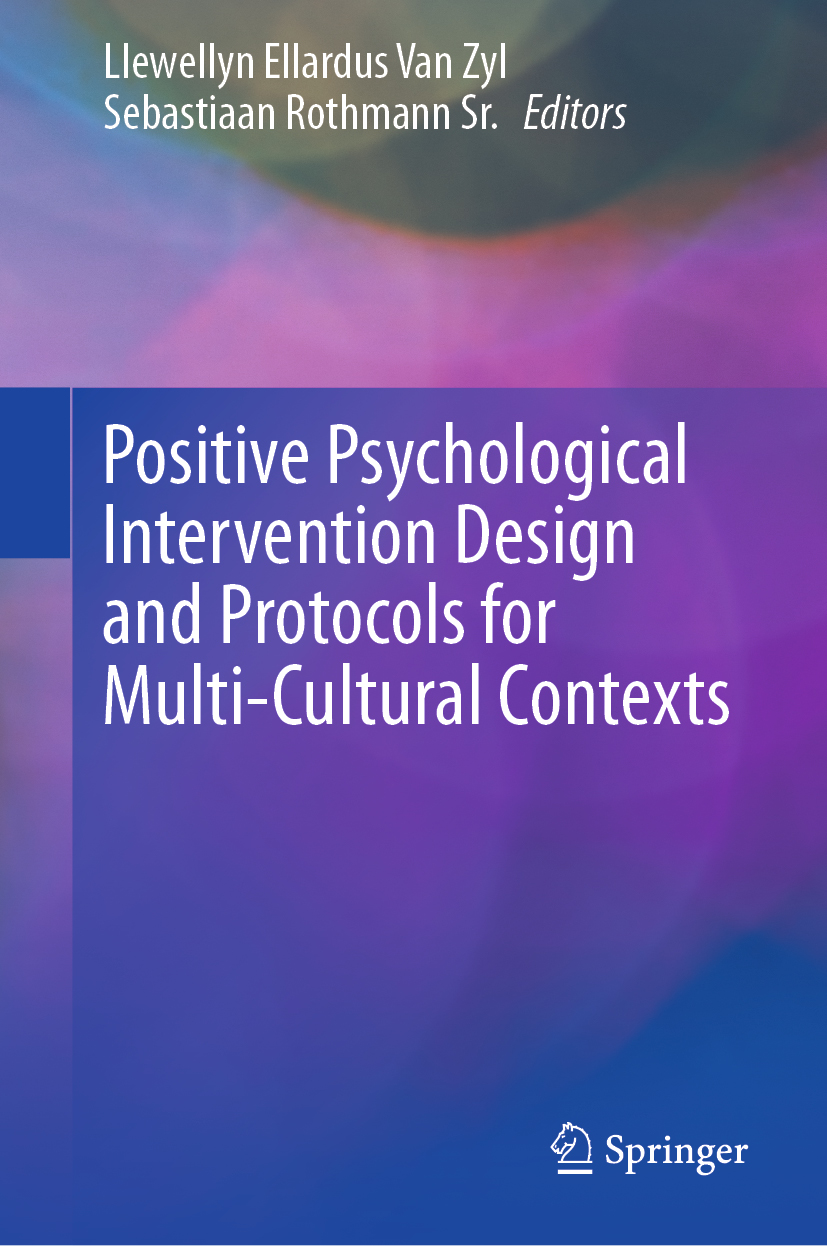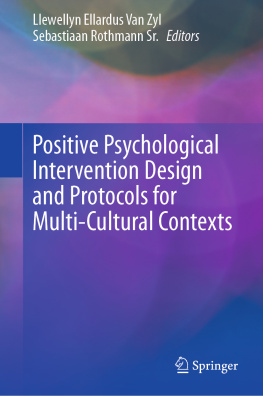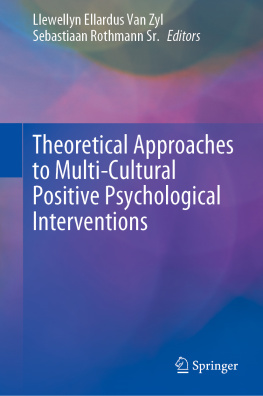Llewellyn Ellardus Van Zyl - Positive Psychological Intervention Design and Protocols for Multi-Cultural Contexts
Here you can read online Llewellyn Ellardus Van Zyl - Positive Psychological Intervention Design and Protocols for Multi-Cultural Contexts full text of the book (entire story) in english for free. Download pdf and epub, get meaning, cover and reviews about this ebook. year: 2019, publisher: Springer International Publishing, genre: Romance novel. Description of the work, (preface) as well as reviews are available. Best literature library LitArk.com created for fans of good reading and offers a wide selection of genres:
Romance novel
Science fiction
Adventure
Detective
Science
History
Home and family
Prose
Art
Politics
Computer
Non-fiction
Religion
Business
Children
Humor
Choose a favorite category and find really read worthwhile books. Enjoy immersion in the world of imagination, feel the emotions of the characters or learn something new for yourself, make an fascinating discovery.
- Book:Positive Psychological Intervention Design and Protocols for Multi-Cultural Contexts
- Author:
- Publisher:Springer International Publishing
- Genre:
- Year:2019
- Rating:4 / 5
- Favourites:Add to favourites
- Your mark:
- 80
- 1
- 2
- 3
- 4
- 5
Positive Psychological Intervention Design and Protocols for Multi-Cultural Contexts: summary, description and annotation
We offer to read an annotation, description, summary or preface (depends on what the author of the book "Positive Psychological Intervention Design and Protocols for Multi-Cultural Contexts" wrote himself). If you haven't found the necessary information about the book — write in the comments, we will try to find it.
Llewellyn Ellardus Van Zyl: author's other books
Who wrote Positive Psychological Intervention Design and Protocols for Multi-Cultural Contexts? Find out the surname, the name of the author of the book and a list of all author's works by series.
Positive Psychological Intervention Design and Protocols for Multi-Cultural Contexts — read online for free the complete book (whole text) full work
Below is the text of the book, divided by pages. System saving the place of the last page read, allows you to conveniently read the book "Positive Psychological Intervention Design and Protocols for Multi-Cultural Contexts" online for free, without having to search again every time where you left off. Put a bookmark, and you can go to the page where you finished reading at any time.
Font size:
Interval:
Bookmark:


This Springer imprint is published by the registered company Springer Nature Switzerland AG
The registered company address is: Gewerbestrasse 11, 6330 Cham, Switzerland
Acquiring life skills has always been part of human life. We are consciously choosing animals that must learn how to find a way of life that fits us, and we are social animals who must learn how to deal with our fellow men. Such life skill learning is part of our informal daily socialization and experience in practices, but over the course of societal modernization, it became increasingly systematized and professionalized.
An early step in this development has been the emergence of professional moral advisors, typically priests and philosophers, who often used stories about exemplary saints and heroes as didactical tools. Another step has been the development of educational institutions, such as schools and military academies, in which nowadays we spend about a quarter of our lives. Contemporary modern societies provide a varied assortment of specialized professional skill trainings, such as in the business sector trainings in leadership and time management and in the private sector trainings in marital behaviour and self-understanding. Though starting from practical wisdom, these life skill courses have become increasingly driven by theoretical inspiration and empirical effect research.
Positive psychology is a latecomer in this development. The movement emerged around the year 2000, drawing on various existing theories and training practices, taken from humanistic psychology in particular. One of the promises of positive psychology was to provide a better scientific basis for these training practices. A science of positive psychology has developed since and now includes university courses, research associations, conferences and scientific journals. Yet, positive psychology is still less professionalized than clinical psychology. Evidence for the effectiveness of many positive psychology interventions is still weak and information on what works for whom often lacking.
This backlog has arisen for several reasons, one of which is financial. There is typically more money available for relieving mental misery than for testing ways to foster optimal functioning. Since healthcare systems mostly do not pay for positive psychological interventions, there is little incentive for them to invest in research on the effect of these treatments and in the education of coaches and trainers. The profession consists largely of small business practitioners and is unable to generate much research. A substantive reason for the research backlog could be that the object of positive psychological interventions is typically less clear than most syndromes treated by clinical psychologists, anxiety and depression in particular. The reasons behind sub-optimal functioning are often less easy to identify and tailored interventions hence more difficult.
In this context, this book provides several steps to further the professionalization of positive psychology. It will not be the last book on intervention designs in positive psychology, but it is an indispensable start.
With the rise in popularity of positive psychological interventions (PPIs) during the last two decades, a steady increase in the academic literature on the design and evaluation of such interventions is prevalent. However, most of the methods, models and approaches which underpin PPIs have been confined to clinical samples, closed systems or monocultural contexts. This in return restricts the applicability of popular PPIs to the contexts in which they were developed and raises questions regarding the extent to which they could be applied to other contexts. Further, those methods, approaches and models which are multi-culturally applicable are not readily consumed by the mass-market as a result of the restrictions regarding both distribution and copyright imposed by scientific journals. Similarly, extensive practical intervention protocols, designs and methods which usually accompany first draft intervention papers are condensed into brief paragraphs in final manuscripts or removed in its entirety. This, in turn, deludes the potential for replicability or adoption by consumers, practitioners or industry. The purpose of this volume is to present innovative and contemporary methodologies and intervention protocols for the enhancement of positive psychological attributes within multi-cultural contexts. The focus is on developing guidelines for enhancing positive psychological attributes, such as positive moods (e.g. positive affect and life satisfaction), strengths (e.g. gratitude, humour), cognition (e.g. hope, optimism) and behaviours (e.g. emotional regulation, positive relationship building) within multi-cultural contexts. Finally, the aim is to present theoretical approaches towards the development and evaluation of PPIs within multi-cultural contexts.
This volume aims to bridge the sciencepractitioner gap by presenting specific intervention protocols and frameworks about the development of positive psychological attributes such as humour, gratitude and flourishing within multi-cultural contexts. It provides specific guidelines on the design, dissemination and evaluation of PPIs within multi-cultural contexts. Furthermore, it provides practice-friendly approaches towards the enhancement of positive capacities through self-administered intentional activities, group-based development and individual therapeutic techniques.
Font size:
Interval:
Bookmark:
Similar books «Positive Psychological Intervention Design and Protocols for Multi-Cultural Contexts»
Look at similar books to Positive Psychological Intervention Design and Protocols for Multi-Cultural Contexts. We have selected literature similar in name and meaning in the hope of providing readers with more options to find new, interesting, not yet read works.
Discussion, reviews of the book Positive Psychological Intervention Design and Protocols for Multi-Cultural Contexts and just readers' own opinions. Leave your comments, write what you think about the work, its meaning or the main characters. Specify what exactly you liked and what you didn't like, and why you think so.












